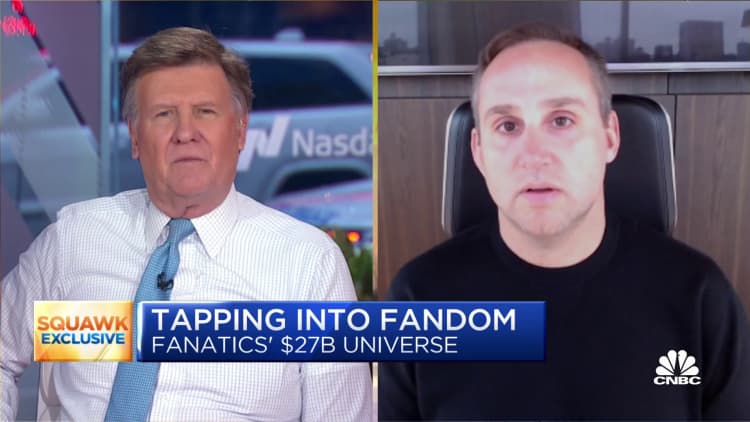[ad_1]
Track President Brandon Igdalsky addresses the media and fans as NASCAR debuts the new FANATICS fan shopping experience at Pocono Raceway on Friday morning prior to the weekends events for the running of the Windows 10 400 in Long Pond, PA.
David Hahn | Icon Sportswire | Getty Images
Sports platform Fanatics and competitor Panini have in recent days become enmeshed in a legal battle, with a pair of lawsuits between the trading card rivals.
Last week, Panini filed an antitrust lawsuit against Fanatics alleging that it had engaged in “calculated, intentional, anticompetitive conduct” to establish a monopoly in the trading card industry. On Monday, Fanatics countersued, alleging interference with business relations and a breach of duty to negotiate in good faith.
The dispute comes down to licensing rights for professional sports league and their associated trading cards: Panini currently has the league and player union licenses to produce trading cards for the NBA and NFL. It’s held those exclusive rights since 2009 and 2016, respectively.
But Fanatics secured long-term deals with both leagues and their unions to take over the exclusive rights once the existing deals expire in 2025 and 2026, respectively.
In its antitrust suit against Fanatics, Panini alleged that “Fanatics positioned itself to drive Panini and other potential competitors out of the market, and erected barriers to entry blocking their return.”
Panini also alleged that it was not “given an opportunity to bid or otherwise compete for the licenses Fanatics acquired.”
Fanatics, in its countersuit, denied antitrust behavior and said it won the rights because of a superior offer and because Panini had “failed to capitalize on its opportunities.”
Fanatics claims Panini “embarked on a protracted, unlawful, and deceitful campaign of unfair trade practices, strong-arm tactics, and tortious misconduct to hamper Fanatics Collectibles’ nascent business, in the hopes that it could force Fanatics Collectibles to pay an extortionate amount for Panini to terminate its licenses early.”
Fanatics declined to comment further on the lawsuits. Panini America could not be immediately reached for comment.
Fanatics, which started as an e-commerce platform in 2011, has quickly grown to hold exclusive merchandise rights spanning from the NFL and NBA to the International Olympic Committee.
In recent years, the company has turned toward trading cards and collectibles and sports betting, looking to deepen the connection it has already made with millions of sports fans through its apparel business.
In 2021, Fanatics signed a deal with MLB and its players association to become the exclusive licensee of baseball cards, ending what had been a 70-year relationship between Topps and MLB. The move also helped to terminate a SPAC merger for Topps after it lost the MLB rights. Topps was ultimately acquired by Fanatics in January 2022.
In recent months, the company has looked to advance its trading cards and collectibles business, adding things like game-worn jersey patches to rookie cards and launching a livestream shopping experience where card collectors can take part in live card “breaking.”
The company’s specific trading card business was valued at $10.4 billion in September 2021 after a $350 million Series A round that included Silver Lake, Endeavor Group holdings and private equity firm Insight Partners, according to multiple media reports. The NBA and MLB, as well as their player unions, also have equity stakes in the company as part of their licensing deals.
In December, the three-time CNBC Disruptor 50 company raised $700 million to bring its valuation to $31 billion.

[ad_2]

